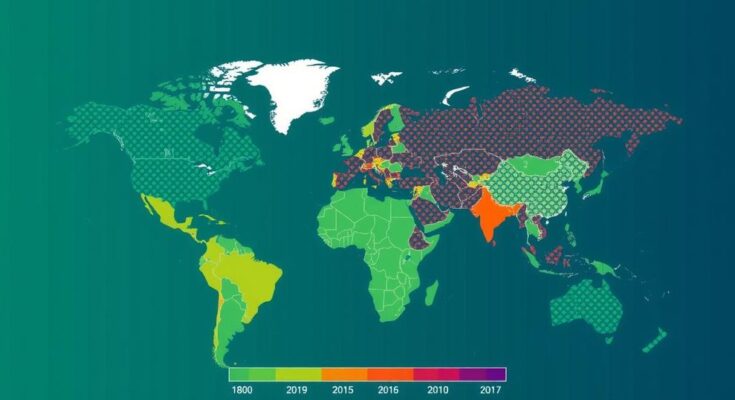The 2024 elections worldwide demonstrate a decline in commitment to climate action, despite increasing natural disasters, with notable victories for climate skeptics such as Donald Trump. Although there were some positive electoral outcomes for climate action, the overall discourse has shifted to prioritize inflation and energy costs, leading to a disheartening climate summit, Cop29, that highlighted ongoing political disengagement from urgent climate obligations.
In an unprecedented election year worldwide, there has been a concerning trend regarding climate action commitment, which appears to be waning even in the face of increasing global disasters and record-breaking temperatures. As roughly half of the world’s population participated in elections dubbed the “biggest election year in human history,” notable victories were observed for climate skeptics like Donald Trump, the right-wing factions in the European Union, and Vladimir Putin in Russia. Such electoral outcomes beg the question of public prioritization, particularly as observable climate events intensify.
Catherine Fieschi, a European politics expert, articulated the situation succinctly, stating that climate action has not only been neglected but lost momentum in advanced economies. She noted, “It’s been a bad year for climate and we’ve seen a gradual erosion in the public’s commitment to action for a couple of years now.” The pandemic’s effects, alongside geopolitical tensions and economic concerns, have shifted focus away from climate issues toward pressing matters such as inflation and energy prices. Ironically, despite this year potentially being the hottest on record, discussions surrounding climate matters have been marginalized during electoral campaigns.
In India, intense farmer protests regarding extreme weather and disrupted harvests provided a vital backdrop as Narendra Modi secured a third term, highlighting local climate impacts. Conversely, right-wing parties performed well across Europe by framing climate action as an economic burden, while Trump’s recent success in the U.S. involved pledges to dismantle environmental protections.
While there are signs of resilience, particularly with the Labour Party’s significant victory in the UK promoting clean energy, the overall global momentum for climate action seems to be faltering. Experts indicate that center-right parties are making concessions on climate to appeal to voters, potentially empowering more extreme narratives around climate change to gain political traction.
The year concluded with a disheartening outcome at the Cop29 climate summit in Azerbaijan, where most global leaders failed to attend, underscoring the perceived lack of urgency around climate commitments. The summit’s frivolity was illustrated by President Aliyev’s assertion that oil and gas were a “gift of God,” while Argentina’s withdrawal from negotiations indicated a troubling trend of nations backing away from climate responsibilities amid political shifts.
As global emissions and climate finance stagnate, activists express growing frustration over the hypocrisy of leadership claiming climate responsibility without actionable measures. Gerry Arances voiced concern, stating that “the halls of Cop29 are already flooded with many Trumps,” criticizing the failure of historically polluting nations to uphold climate commitments. Edi Rama, the Prime Minister of Albania, echoed similar sentiments by questioning the meaning of continuing discussions when major polluters remain unaccountable. While advancements in renewable energy offer a sliver of hope, the looming specter of political disregard for climate action portends dire consequences, necessitating urgent attention and engagement before it is too late.
The article discusses the significant global political events occurring in 2024, termed the “biggest election year in human history,” characterized by shifts in commitments towards addressing the climate crisis. Notably, numerous elections worldwide have resulted in the successes of leaders and parties that generally oppose substantial climate action, despite the growing severity of climate-related disasters. The juxtaposition of rising public awareness of climate issues against the shrinking political will to address them is explored. Through expert analysis and observations from recent election patterns, the text highlights the evolving discourse surrounding climate priorities in political agendas.
In summary, the 2024 electoral landscape reflects a troubling trend of diminished commitment to climate action as populist sentiments gain ground in several regions. Despite record levels of global warming and environmental crises, political leaders increasingly prioritize immediate economic concerns over sustainable policies. The Cop29 summit illustrates a further disconnect between claims of climate leadership and the actions taken, emphasizing the urgent need for renewed focus and accountability in addressing climate change as a global priority.
Original Source: www.theguardian.com




